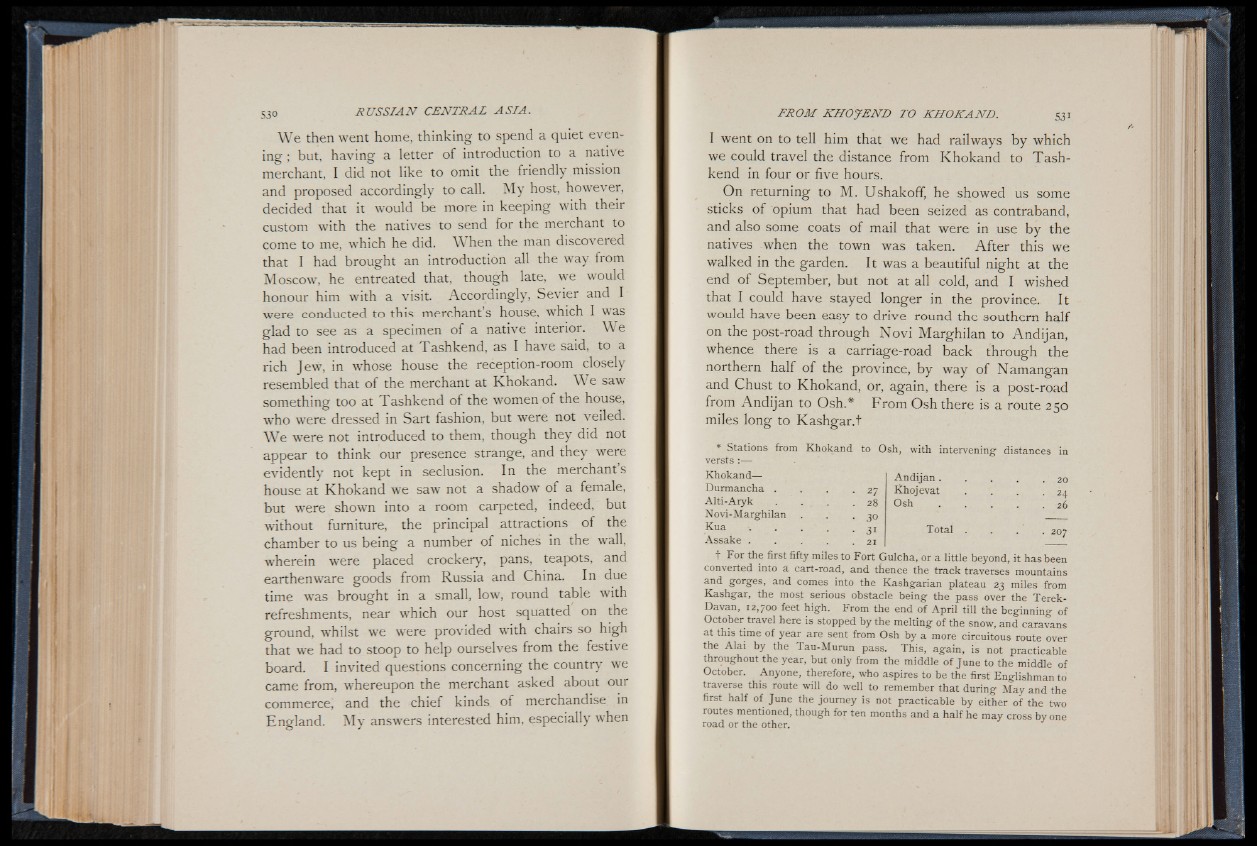
We then went home, thinking to spend a quiet evening
; but, having a letter of introduction to a native
merchant, I did not like to omit the friendly mission
and proposed accordingly to call. My host, however,
decided that it would be more in keeping with their
custom with the natives to send for the merchant to
come to me, which he did. When the man discovered
that I had brought an introduction all the way from
Moscow, he entreated that, though late, we would
honour him with a visit. Accordingly, Sevier and I
were conducted to this merchant’s house, which I was
glad to see as a specimen of a native interior. We
had been introduced at Tashkend, as I have said, to a
rich Jew, in whose house the reception-room closely
resembled that of the merchant at Khokand. We saw
something too at Tashkend of the women o f the house,
who were dressed in Sart fashion, but were not veiled.
W e were not introduced to them, though they did not
appear to think our presence strange, and they were
evidently not kept in seclusion. In the merchant’s
house at Khokand we saw not a shadow of a female,
but were shown into a room carpeted, indeed, but
without furniture, the principal attractions of the
chamber to us being a number of niches in the wall,
wherein were placed crockery, pans, teapots, and
earthenware goods from Russia and China. In due
time was brought in a small, low, round table with
refreshments, near which our host squatted on the
ground, whilst we were provided with chairs so high
that we had to stoop to help ourselves from the festive
board. I invited questions concerning the country we
came from, whereupon the merchant asked about our
commerce, and the chief kinds of merchandise in
England. My answers interested him, especially when
I went on to tell him that we had railways by which
we could travel the distance from Khokand to Tashkend
in four or five hours.
On returning to M. Ushakoff, he showed us some
sticks of opium that had been seized as contraband,
and also some coats of mail that were in use by the
natives when the town was taken. After this we
walked in the garden. It was a beautiful night at the
end of September, but not at all cold, and I wished
that I could have stayed longer in the province. It
would have been easy to drive round the southern half
on the post-road through Novi Marghilan to Andijan,
whence there is a carriage-road back through the
northern half of the province, by way of Namangan
and Chust to Khokand, or, again, there is a post-road
from Andijan to Osh.* From Osh there is a route 250
miles long to Kashgar.t
* Stations from Khokand to Osh, with intervening distances in
versts :— -
Khokand—
Durmancha .
Alti-Aryk
N ovi- Marghilan
Kua
Assake .
27
28
30
31
21
Andijan .
Khoievat
Osh
Total
24
26
207
t For the first fifty miles to Fort Gulcha, or a little beyond, it has been
converted into a cart-road, and thence the track traverses mountains
and gorges, and comes into the Kashgarian plateau 23 miles from
Kashgar, the most serious obstacle being the pass over the Terek-
Davan, 12,700 feet high. From the end of April till the beginning of
October travel here is stopped by the melting of the snow, and caravans
a t this time of year are sent from Osh by a more circuitous route over
the A la i by the Tau-Murun pass. This, again, is not practicable
throughout the year, but only from the middle of June to the middle of
October. Anyone, therefore, who aspires to be the first Englishman to
traverse this route will do well to remember that during May and the
first half of June the journey is not practicable by either of the two
routes mentioned, though for ten months and a half he may cross by one
road or the other.